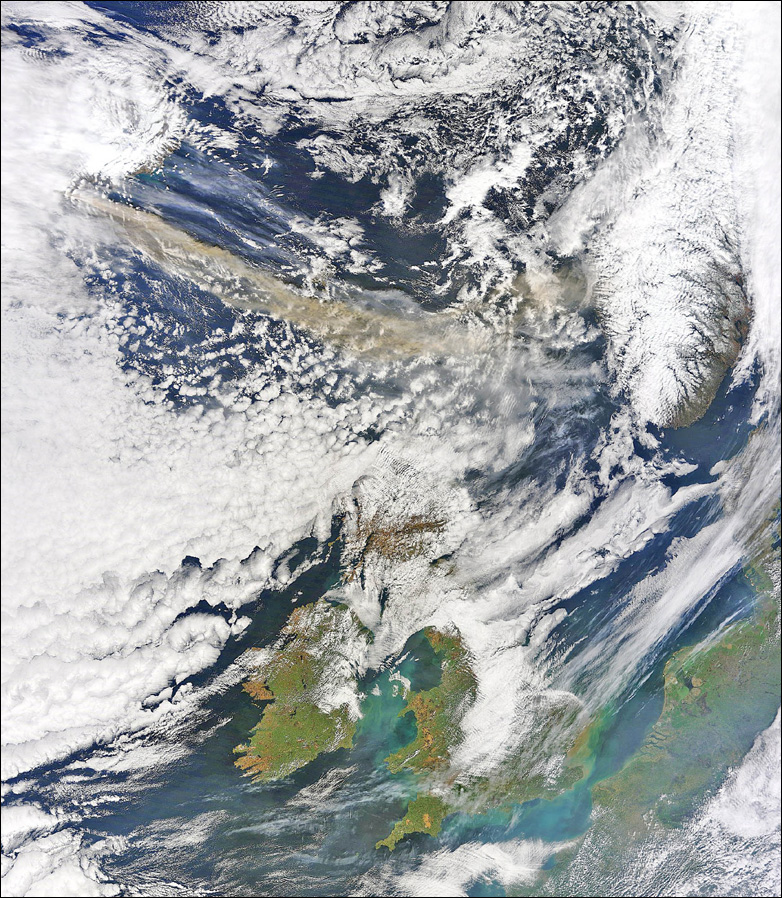The International Air Transport Association (IATA) announced today that airlines are losing $200m per day because of the ash-related cancellation of flights, and it called that estimate “initial and conservative,” insofar as it doesn’t include the added costs of re-routing aircraft and caring for stranded passengers and planes. The ripple effect of flight cancellations extends to European exports and imports; for example, “in value terms, around 30% of UK exports are transported by air – with the pharmaceutical industry particularly reliant on air freight, due to the high value and low weight of their products” (BBC News).
About 500,000 people pass through British airports every day, and UK flight restrictions have been extended until at least 1am Sunday, except for a small number of domestic flights within Scotland. While this has created a logistical and financial nightmare for airlines, it has benefited land transportation and hotel industries—Keith Clarke, currently in London, reports that “the volcano situation is causing much havoc, now creating a shortage of hotel rooms.”
The literal fallout of ash is also becoming a concern, and people with severe respiratory conditions have been advised to stay indoors as the first ash began to fall at ground level in parts of the UK. Today, a Met Office spokesman said he expected winds on Monday to push clouds covering the northern parts of the British Isles back out towards the Atlantic, but that southern regions would remain affected by ash until the middle of next week. In Iceland itself, the civil protection department advised people in affected areas to wear masks and those with respiratory problems to stay indoors. Icelanders have been advised to wear protective clothing and goggles outdoors, and livestock have been moved indoors. Dr Dougal Jerram, a volcanologist from the Department of Earth Sciences at Durham University, underlined the concerns by pointing out that, “One of the most influential ever eruptions was the 1783-1784 event at Laki in Iceland when an estimated 120 million tonnes of sulphur dioxide were emitted, approximately equivalent to three times the total annual European industrial output in 2006. This outpouring of sulphur dioxide during unusual weather conditions caused a thick haze to spread across Western Europe, resulting in many thousands of deaths throughout 1783 and the winter of 1784” (BBC; ibid.).
The ripple effect of the fallout is global. For example, the head of the Kenya Flower Council says the flight disruption is costing growers between $1.5m and $2m a day. Flowers are Kenya’s biggest export, accounting for about 20% of all exports, with 97% of all Kenya’s flower exports being sent to the European Union. U.S. medical evacuations for troops in Iraq and Afghanistan are being flown directly from the war zones to Washington rather than to care facilities in Germany where airports have been closed “until further notice.” Many international mail services have been suspended or, at best, severely delayed, and the main European air hubs for UPS and FedEx have been closed indefinitely. The ash may also force airlines to fly alternate, less efficient routes, and that, in turn could spike crude demand, leading to higher world gas prices.
Remember Waldo Tobler’s first law of Geography which states that “Everything is related to everything else, but near things are more related than distant things.” “This observation is embedded in the gravity model of trip distribution. It is also related to the law of demand, in that interactions between places are inversely proportional to the cost of travel between them” (Wikipedia).
Article by Bill Norrington


.svg.png)

